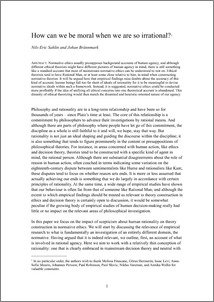Sahlin, Nils-Eric and Brännmark, Johan
(2008)
How can we be moral when we are so irrational?
[Preprint]
![[img]](https://philsci-archive.pitt.edu/style/images/fileicons/application_pdf.png)  Preview |
|
PDF
How_can_we_be_moral_when_we_are_so_irrational_(PhilSciArchive).pdf
Download (221kB)
|
Abstract
Normative ethics usually presupposes background accounts of human agency, and although different ethical theorists might have different pictures of human agency in mind, there is still something like a standard account that most of mainstream normative ethics can be understood to rest on. Ethical theorists tend to have Rational Man, or at least some close relative to him, in mind when constructing normative theories. It will be argued here that empirical findings raise doubts about the accuracy of this kind of account; human beings fall too far short of ideals of rationality for it to be meaningful to devise normative ideals within such a framework. Instead, it is suggested, normative ethics could be conducted more profitably if the idea of unifying all ethical concerns into one theoretical account is abandoned. This disunity of ethical theorizing would then match the disunited and heuristic-oriented nature of our agency.
Monthly Views for the past 3 years
Monthly Downloads for the past 3 years
Plum Analytics
Actions (login required)
 |
View Item |



